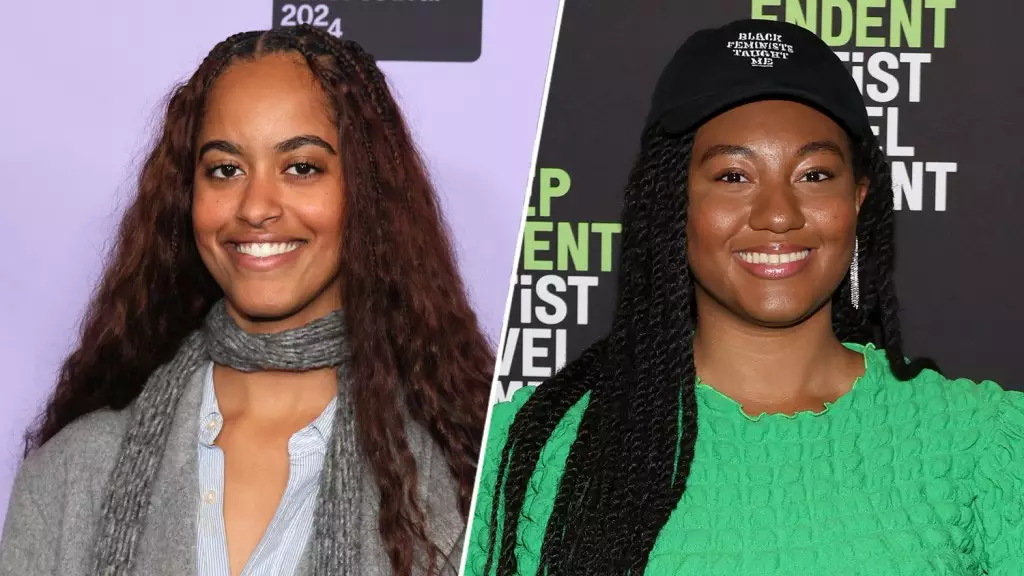In the often tumultuous world of independent filmmaking, originality is not just a desirable trait; it’s the very essence that separates aspiring directors from the masses. Malia Obama’s recent foray into this delicate arena has stirred waves of conversation, particularly surrounding claims of artistic appropriation. Fresh off her debut short film unveiled at the 2024 Sundance Film Festival, the Chicago-born filmmaker faces scrutiny from her peers. Natalie Jasmine Harris, a fellow director whose film “Grace” shared a stage with Obama’s “The Heart,” has voiced profound disappointment, suggesting that elements of her work were echoed in a Nike advertisement featuring WNBA player A’ja Wilson. This incident not only unveils the fragility of artistic integrity but also highlights an alarming trend in Hollywood: the overshadowing of independent voices by established names.
The Weight of Influence
Artistic expression, by its very nature, is an amalgam of influences, experiences, and cultural narratives. Yet, when that influence tips into imitation, the boundaries of creative ownership blur, leaving those on the fringes feeling sidelined. Harris articulates this unsettling phenomenon, revealing her visceral reaction upon discovering the commercial. Initial confusion transitioned into disappointment as she spotted striking resemblances between her narrative and the commercial’s portrayal of a seemingly innocuous game of pat-a-cake. Is it merely coincidence, or does it signify a deeper issue within the industry? Critically, Harris poses a crucial question: if the imagery was so evocative of her own work, why wasn’t she called upon to contribute? This inquiry resonates within the larger context of support (or lack thereof) for burgeoning artists.
Hollywood’s Continuing Neglect of Emerging Voices
Harris’s reflections thrust us into the broader discourse regarding representation in film. It’s a familiar lament: in an age where names like Spielberg and Lee dominate cinematic discussions, how can emerging directors carve their niche in an unforgiving market? When a prominent figure like Malia Obama steps into the limelight, the impact on newcomers like Harris can feel suffocating. It’s not merely about the art but the entire ecosystem surrounding it. Harris’s sentiments about the need for brands to champion independent artists rather than defaulting to established names should resonate with those of us who want a diverse tapestry of storytelling to flourish. By opting for the easily recognizable over the genuinely original, brands constrain the future of filmmaking to mere replication.
The stark Reality of Cultural Appropriation
Adding another layer to this intricate issue is the lingering specter of cultural appropriation. It’s not that Malia intended to plagiarize, but the ramifications of her work resonating with that of another artist—especially one from a marginalized community—cannot be overlooked. Cultural dialogue is not monolithic; it thrives on the exchange of ideas and experiences, yet the appropriation of these narratives often leaves original creators disenfranchised. As someone who has attended numerous director’s events alongside prominent figures, Harris’s voice brings forth a powerful narrative of not just personal disappointment but a larger cultural frustration.
The Need for Acknowledgment and Change
What becomes paramount in this discussion is the desire for recognition. Harris explicitly expresses this yearning for acknowledgment from Obama and Nike, a sentiment that should resonate deeply within any artistic community. The silence in the wake of her articulations is telling of a broader oversight towards those who are not entrenched in the fabled stories that often dominate public consciousness. The fear of backlash against challenging figures like Obama, combined with the adoration surrounding brands like Nike, has made it easier for such criticisms to be overlooked.
The question remains: when will the industry wake up? We stand at a crossroads, and if we’re not vigilant, the voices of budding filmmakers like Harris risk being drowned out in a cacophony of familiar names and faces. The responsibility lies not only with creators but with institutions too, to uplift and nurture those on the path to originality rather than allowing their narratives to flicker under the weight of familiar fame. In an industry that thrives on stories, it should never be acceptable for any story to go unacknowledged.

